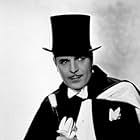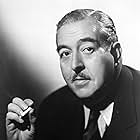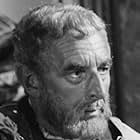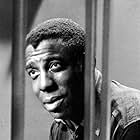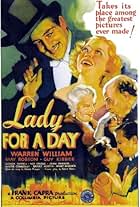IMDb RATING
6.7/10
1.2K
YOUR RATING
A runaway heiress and her sister's husband join forces to race the latter's fast horse, Broadway Bill.A runaway heiress and her sister's husband join forces to race the latter's fast horse, Broadway Bill.A runaway heiress and her sister's husband join forces to race the latter's fast horse, Broadway Bill.
- Awards
- 1 nomination total
Douglass Dumbrille
- Eddie Morgan
- (as Douglas Dumbrille)
Jason Robards Sr.
- Arthur Winslow
- (as Jason Robards)
- Director
- Writers
- All cast & crew
- Production, box office & more at IMDbPro
Storyline
Did you know
- TriviaAfter Paramount Pictures bought the rights to this film, the studio pulled it from circulation to avoid competition with Frank Capra's remake Riding High (1950). The film remained unseen until it was re-released in the 1990s.
- Quotes
Dan Brooks: Doesn't anything ever change in this mausoleum?
Alice Higgins: Yes. Bedspreads and underwear.
- ConnectionsEdited into Riding High (1950)
- SoundtracksThe Last Round-Up (Git Along, Little Dogie, Git Along)
(1933) (uncredited)
Music and Lyrics by Billy Hill
Sung a cappella by Clarence Muse and Warner Baxter
Then played in the score
Featured review
Once upon a time, horse racing was considered the sport of kings. In the first half of the 20th century, it was the most popular sport in America - believe it or not. Baseball may have been America's favorite pastime then, but more people followed the horses than any other sport.
Of course, well into the second half of the 20th century, horse racing had come to lose its moniker as a sport. And, the public's interests had then grown to include more organized and competitive sports such as football, soccer, basketball, tennis and golf. Horse racing in America has itself continued to decline in all aspects - the numbers of tracks, horse farms and animals, trainers and followers.
But, with that background, one can understand why a considerable number of movies were made about horse racing during Hollywood's Golden Era. The plots of many were built around the race track or the horses, while others had days at the races. Some were crime and mystery films, some were comedies and romances, others were dramas. "Broadway Bill" is a combination drama, comedy and romance.
Many of these dramas had similar plots. This is a fairly good story with a top cast of the period. Warner Baxter is Dan Brooks and Myrna Loy is Alice Higgins. Behind those leads are some top supporting actors of the day. Walter Connolly is J.L. Higgins, Alice's father. Raymond Walburn plays Col. Pettigrew and Douglas Dumbrille is Eddie Morgan.
Brooks is one of three men married to daughters of J.L., each of whom has been installed as president of one of the self-made millionaire's companies. All seem happy with their lot, and Dan did for a while because he loved his wife, Helen Vinton plays Margaret, who basks in the comfort of her hierarchically demanding father, J.L., played by Connolly. But, Dan's yen for race horses begins to sway his heart away from giving his all to the box company he has headed since marrying Helen.
Myrna Loy is the youngest, as yet unmarried of the Higgins daughters. While J.L. has one last company presidency to install on whomever Alice marries, she has her heart set more on Dan. There's no hanky panky going on here, but she shares Dan's enthusiasm for racing and his prize colt, Broadway Bill. Dan hopes to start racing his horse, and is aiming for the big derby. When he finally leaves his job and the family to put everything into racing his horse, wife Margaret doesn't go after him. Her thinking is that he will either come back to her or they are through. So, it's not hard to imagine how the film ends.
Columbia Pictures had been a Poverty Row studio in the 1920s, and was a second-tier studio by the early 1930s. But director and writer Frank Capra's work for Harry Cohn was gaining the studio wide recognition. After a 1933 Oscar nomination for "Lady for a Day," Cohn and Capra made "It Happened One Night" in February 1934. It would win the studio its first Academy Awards, and be the first movie to win the top four Oscars - for best picture, director, actor and actress. But after that, and before the next major story that Capra would work on ("Mr. Deeds Goes to Town"), he made "Broadway Bill" for Columbia.
A number of things about this production show that Columbia (and Capra, perhaps?) were still in that second tier of studios. The opening scene of "Broadway Bill" is an example. Dan Brooks is driving alongside a racing horse. It had to seem phony even way back then - it was a stage setting with a stationary car filmed with a video of a horse running behind - to the side of the car. The film shows some other deficiencies as well. Its scenes are choppy in places, and some seem to have poor direction or editing. And the screenplay itself is weak. There are some scenes when one waits for Baxter to say his next line, while he stands there tearing hay apart in his hands.
Capra himself didn't think too much of this film in later years. He wanted to remake it, which he did in 1950 as "Riding High." While the plot stayed the same, it was a musical comedy with Bing Crosby in the lead.
This isn't a rollicking comedy, but it is a somewhat interesting, if jumbled story. Those who enjoy old films may like this one. Others might find it too slow or boring. Here are some favorite lines.
Col. Pettigrew, played by Raymond Walburn, "Milked by my own chicanery."
Oscar 'Happy' McGuire, played by Lynne Overman, "First time I ever saw a guy sucked in by his own gag."
Col. Pettigrew, "Well, I guess I'm just a child of impulse."
Of course, well into the second half of the 20th century, horse racing had come to lose its moniker as a sport. And, the public's interests had then grown to include more organized and competitive sports such as football, soccer, basketball, tennis and golf. Horse racing in America has itself continued to decline in all aspects - the numbers of tracks, horse farms and animals, trainers and followers.
But, with that background, one can understand why a considerable number of movies were made about horse racing during Hollywood's Golden Era. The plots of many were built around the race track or the horses, while others had days at the races. Some were crime and mystery films, some were comedies and romances, others were dramas. "Broadway Bill" is a combination drama, comedy and romance.
Many of these dramas had similar plots. This is a fairly good story with a top cast of the period. Warner Baxter is Dan Brooks and Myrna Loy is Alice Higgins. Behind those leads are some top supporting actors of the day. Walter Connolly is J.L. Higgins, Alice's father. Raymond Walburn plays Col. Pettigrew and Douglas Dumbrille is Eddie Morgan.
Brooks is one of three men married to daughters of J.L., each of whom has been installed as president of one of the self-made millionaire's companies. All seem happy with their lot, and Dan did for a while because he loved his wife, Helen Vinton plays Margaret, who basks in the comfort of her hierarchically demanding father, J.L., played by Connolly. But, Dan's yen for race horses begins to sway his heart away from giving his all to the box company he has headed since marrying Helen.
Myrna Loy is the youngest, as yet unmarried of the Higgins daughters. While J.L. has one last company presidency to install on whomever Alice marries, she has her heart set more on Dan. There's no hanky panky going on here, but she shares Dan's enthusiasm for racing and his prize colt, Broadway Bill. Dan hopes to start racing his horse, and is aiming for the big derby. When he finally leaves his job and the family to put everything into racing his horse, wife Margaret doesn't go after him. Her thinking is that he will either come back to her or they are through. So, it's not hard to imagine how the film ends.
Columbia Pictures had been a Poverty Row studio in the 1920s, and was a second-tier studio by the early 1930s. But director and writer Frank Capra's work for Harry Cohn was gaining the studio wide recognition. After a 1933 Oscar nomination for "Lady for a Day," Cohn and Capra made "It Happened One Night" in February 1934. It would win the studio its first Academy Awards, and be the first movie to win the top four Oscars - for best picture, director, actor and actress. But after that, and before the next major story that Capra would work on ("Mr. Deeds Goes to Town"), he made "Broadway Bill" for Columbia.
A number of things about this production show that Columbia (and Capra, perhaps?) were still in that second tier of studios. The opening scene of "Broadway Bill" is an example. Dan Brooks is driving alongside a racing horse. It had to seem phony even way back then - it was a stage setting with a stationary car filmed with a video of a horse running behind - to the side of the car. The film shows some other deficiencies as well. Its scenes are choppy in places, and some seem to have poor direction or editing. And the screenplay itself is weak. There are some scenes when one waits for Baxter to say his next line, while he stands there tearing hay apart in his hands.
Capra himself didn't think too much of this film in later years. He wanted to remake it, which he did in 1950 as "Riding High." While the plot stayed the same, it was a musical comedy with Bing Crosby in the lead.
This isn't a rollicking comedy, but it is a somewhat interesting, if jumbled story. Those who enjoy old films may like this one. Others might find it too slow or boring. Here are some favorite lines.
Col. Pettigrew, played by Raymond Walburn, "Milked by my own chicanery."
Oscar 'Happy' McGuire, played by Lynne Overman, "First time I ever saw a guy sucked in by his own gag."
Col. Pettigrew, "Well, I guess I'm just a child of impulse."
- How long is Broadway Bill?Powered by Alexa
Details
- Runtime1 hour 44 minutes
- Color
- Aspect ratio
- 1.37 : 1
Contribute to this page
Suggest an edit or add missing content











